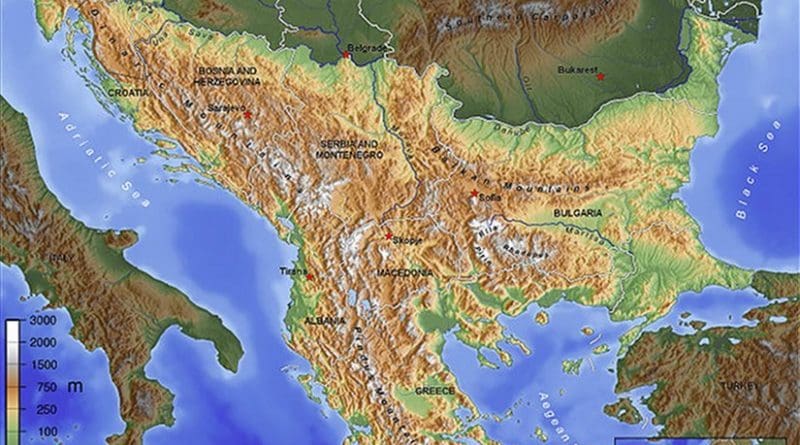Decreasing Liquidity Risk To Balkan Banks, Economies
By SETimes
By Aleksandar Pavlevski
With the financial turmoil in Greece threatening the stability of the banking sector across the region, policymakers in Macedonia say the country must take steps to contain the risk.
Greek banks play a significant role in regional markets, including in Bulgaria and Serbia as well as Macedonia.
To minimise the danger, the economy must maintain its liquidity and creditworthiness, former Deputy Economy Minister Zoran Vitanov told SETimes. A growing problem, he said, is the practice of investing in little-to-no risk projects where the payback is ensured.
“Even though their liquidity will remain unthreatened for a certain period of time,” Vitanov explained, “only those banks which will become more proactive will remain profitable.”
Macedonian companies are undertaking precautionary measures to guard against the effects of the financial crisis. They remain cautious about obtaining credit.
“They are aware the [EU] stagnation and financial turmoil is bringing reduced demand for goods and services in the region, which translates into less work,” Union of Chambers of Commerce Executive Director Mitko Aleksov told SETimes. “If the stagnation turns into full-blown recession or worse, they know they will have a harder time paying off interest rates.”
Given the potential risks, the 18 commercial banks in Macedonia adopted high liquidity rates to withstand potential negative effects and promote market stability, while the government follows a restrictive monetary policy.
Experts argue that even though banking liquidity is not threatened, the liquidity of the overall economy is.
ProCredit Bank officials told SETimes they expect a slowdown of Macedonia’s growth, which was 5.2% in the last quarter, given the country’s interconnection with regional and European economies.
“A slowdown would reduce the economy’s ability to service its obligations toward the banks which would put additional burden on them and negatively influence their policies to offer credit,” they said.
“In addition to the debt crisis, the announced changes in banking regulations within the EU can additionally limit — or make more expensive — the sources for funds for Macedonian banks,” they added.
“We see no big threat to Macedonia’s banking sector, which is stable and highly liquid,” Eurostandard bank head Nikola Petkoski told SETimes.
“But we do expect challenges at the beginning of next year due to reduced demand from troubled EU economies and thus reduced Macedonian exports and amounts of money entering the country,” he explained. “This can cause problems in paying off credit taken from domestic banks.”
“Still, the expected challenges will not be of such magnitude to get the banking system off balance. The guarantees for all banking activities are more than double than for the state, which additionally guarantees stability,” Petkoski said.
Regional economists point to the European Central Bank (ECB) as the only institution able to rectify the situation.
“The role of the ECB is key,” Vitanov said, “but the measures it undertakes must be radical, especially in Greece, Italy, Spain and Portugal. If the primary goal is salvation from the crisis, it appears the economies of whole states will be sacrificed.”
“However, if EU solidarity is the goal, then the crisis will metastasise in time and the entire EU will suffer tremendous consequences, with radical changes of its often dominant position in the world — and regional — markets,” Vitanov added.
The ECB bonds can only cushion the euro’s fall, not stop the process, economist Viktor Trifunovski told SETimes, expressing a commonly held opinion among economists.
“The euro did not become a globally-accepted currency like the US dollar. Thus, the ECB can never act the way the US Federal Reserve Bank can. Simply, there is no great demand for the euro to absorb the monetary expansion of several thousand billion euros,” Trifunovski said.
IHS Global Insight has warned that the Greek crisis is affecting the banks’ ability to ensure liquidity in their field offices in the region, given the weakened required reserves and the reduced level at which they can issue credit.
The warning is particularly important in Macedonia where two big Greek-owned banks — Alfa and Stopanska — operate.
“No bank in Macedonia has a liquidity problem,” Vitanov said, “including the banks operating with Greek capital.”
A crisis makes people save in countries facing financial instability. But reduced spending reduces demand and causes companies — and governments — to lay off people.
Economists say unemployment is a result of the inflationary measures to encourage economic processes. Any attempt to stop inflation presupposes losing all the jobs created with inflationary measures.
If the ECB decides to print money, experts add, it will increase the volume of euros in circulation but also cause inflation as well as trigger the euro’s depreciation relative to other currencies. Imports and GDP may increase, but at the cost of inflation and unemployment.
“In that case, the EU may have an economic fate similar to that of former Yugoslavia, with an unforeseen political fate,” Vitanov said.

